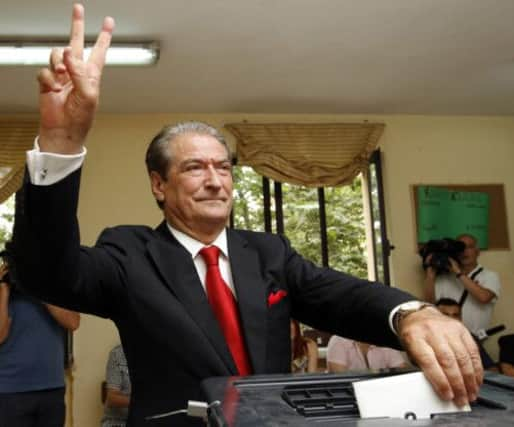Albania: Poll marred by death and fraud claims


Albania has a chequered electoral history since emerging from a hardline Communist regime in 1991. Previous elections have been marred by violence, intimidation and allegations of voter fraud.
Albanian police named the man killed during an exchange of gunfire in Lac, 30 miles north-west of the capital, Tirana, as Gjon Pjeter Gjoni, a supporter of the opposition Socialist Movement for Integration (LSI). The Democratic Party candidate in the region, Mehill Fufi, was seriously wounded during the incident which took place only hours after polls opened in one of the most fiercely contested elections in the history of Albania’s fledgling democracy.
Advertisement
Hide AdAdvertisement
Hide AdThe election pits incumbent conservative prime minister, Sali Berisha against the Socialist Party led by Edi Rama, a former mayor of Tirana. Alastair Campbell, former Labour director of communications, had been advising Mr Rama on election strategy ahead of the vote. Mr Berisha hired US lobbying firm, Podesta Group.
Mr Berisha declined to comment on the killing, saying he needed more information first. The prime minister invited all Albanians to take part in the vote. “I assure you that your vote will be fully respected,” he said after casting his ballot.
Mr Rama, accused police of collaborating in the killing. “It is barbarous that in an election day, in the midst of Europe, a human is shot dead from criminals supported from police,” he told reporters.
Yesterday, in the same region where the shooting took place, journalists from Albanian TV station Top Channel were attacked and had their equipment broken. In Peqin, a journalist from the same station was threatened not to report.
Despite these incidents the election was “overall peaceful” and turnout was high, Lutfi Dervishi executive director of Transparency International Albania told The Scotsman. “Considering that there are more than 5,000 polling station across the country, the situation has been peaceful,” he said.
Questions have been raised about the conduct of this year’s vote. Allegations of voter fraud, including the selling of votes for money, food and even, in some cases, livestock, have been widespread. On Saturday, in the northern region of Lezha, there were reports of votes being bought for as little as €5 or €10 ahead of polls opening.
“I think voter fraud is a bit worse than in other general elections, but I don’t think it will be the deciding factor in who wins and who loses,” said Transparency International’s Lutfi Dervishi.
A political dispute means that it is unclear when a result will be announced. Following a split in Mr Berisha’s ruling coalition in April, the Central Elections Committee (CEC) has only four sitting members – one less than the five required to declare the result of the election.
Advertisement
Hide AdAdvertisement
Hide Ad“If we have a clear winner it won’t be a problem, but if the result is narrow, then it could [be a problem],” said Mr Dervishi.
All Albania’s main parties support membership of the European Union. But yesterday the EU’s top diplomat in Albania was highly critical of the election violence.
“Among the international and European standards for elections, there is the refusal of violence,” said Ettore Sequi, the EU ambassador to Tirana.